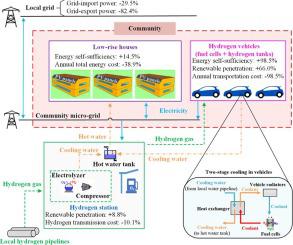Energy Conversion and Management ( IF 9.9 ) Pub Date : 2021-10-09 , DOI: 10.1016/j.enconman.2021.114834 Yingdong He 1, 2 , Yuekuan Zhou 3 , Jing Yuan 1 , Zhengxuan Liu 2, 4 , Zhe Wang 5 , Guoqiang Zhang 2

|
Cleaner power production, distributed renewable generation, building-vehicle integration, hydrogen storage and associated infrastructures are promising for transformation towards a carbon–neutral community, whereas the academia provides limited information through integrated solutions, like intermittent renewable integration, hydrogen sharing network, smart operation on electrolyzer and fuel cell, seasonal hydrogen storage and advanced heat recovery. This study proposes a hybrid electricity-hydrogen sharing system in California, United States, with synergistic electric, thermal and hydrogen interactions, including low-rise houses, rooftop photovoltaic panels, hydrogen vehicles, a hydrogen station, micro and utility power grid and hydrogen pipelines. Advanced energy management strategies were proposed to enhance energy flexibility and grid stability. Besides, simulation-based optimizations on smart power flows of vehicle-to-grid interaction and electrolyzer are conducted for further seasonal grid stability and annual cost saving. The obtained results indicate that, the green renewable-to-hydrogen can effectively reduce reliance on pipelines delivered hydrogen, and the hydrogen station is effective to address security concerns of high-pressure hydrogen and improve participators’ acceptance. Microgrid peer-to-peer sharing can improve hydrogen system efficiency under idling modes. Furthermore, the integrated system can reduce the annual net hydrogen consumption in transportation from 127.0 to 1.2 kg/vehicle. The smart operation (minimum input power of electrolyzer and fuel cell at 65 and 80 kW) can reduce the maximum mean hourly grid power to 78.2 kW by 24.2% and the annual energy cost to 1228.5 $/household by 38.9%. The proposed district hydrogen-based community framework can provide cutting-edge techno-economic guidelines for carbon-neutral transition with district peer-to-peer energy sharing, zero-energy buildings, hydrogen-based transportations together with smart strategies for high energy flexibility.
中文翻译:

向具有氢经济和先进能源管理策略的碳中和住宅社区转型
清洁电力生产、分布式可再生能源发电、建筑车辆集成、储氢和相关基础设施有望向碳中和社区转型,而学术界通过集成解决方案提供的信息有限,如间歇性可再生能源集成、氢共享网络、智能运营电解槽和燃料电池、季节性储氢和先进的热回收。这项研究在美国加利福尼亚州提出了一个混合电力-氢共享系统,具有协同的电、热和氢相互作用,包括低层房屋、屋顶光伏板、氢汽车、氢站、微型和公用电网和氢管道. 提出了先进的能源管理策略,以提高能源灵活性和电网稳定性。此外,对车网交互和电解槽的智能潮流进行了基于仿真的优化,以进一步提高季节性电网稳定性和年度成本节约。研究结果表明,绿色可再生氢能有效降低对管道输送氢气的依赖,加氢站有效解决高压氢气安全隐患,提高参与者接受度。微电网点对点共享可以提高空闲模式下的氢系统效率。此外,集成系统可以将运输中的年净氢消耗量从 127.0 公斤/车减少到 1.2 公斤/车。智能运行(电解槽和燃料电池的最小输入功率为65和80千瓦)可以将最大平均每小时电网功率降低24.2%,将年能源成本降低38.9%至1228.5美元/户。拟议的地区基于氢的社区框架可以为碳中和转型提供尖端的技术经济指导方针,包括地区对等能源共享、零能耗建筑、氢基交通以及高能源灵活性的智能战略。











































 京公网安备 11010802027423号
京公网安备 11010802027423号